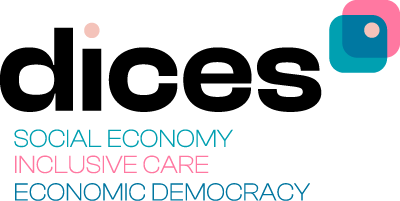Impact and ambition
The overall ambition of DICES is to drive change, both from a scientific and a societal perspective, in order to reduce inequality and address social exclusion-related challenges in Europe. Its focus is on the role and weight of the social economy in doing so, as well as on the governance frameworks and policy measures that are at play.
Expected outcomes
An improved understanding of the role and weight of social economy organisations in countering social exclusion and fostering social inclusion.
To attain a better understanding of the role and weight of the social economy in addressing exclusion and fostering inclusion, and their interrelation with the welfare state and care provision, the following steps are to be taken:
- Map the current knowledge base in research, policy and practice on social exclusion and social inclusion, the underlying drivers and relation to labour markets and welfare states;
- Assess the size, significance, scope and composition of the social economy in Europe, as well as key drivers of and barriers and levers to its development;
- Review the social economy’s impacts in terms of social exclusion and social inclusion, how these are related to the characteristics of social economy organisations as well as the mechanisms linking organisations characteristics to consequences regarding exclusion and inclusion;
- Based on these mappings, identify knowledge and data gaps in the state-of-the-art and explain these gaps;
- Design and implement strategies to fill these gaps and tackle their underlying reasons;
- Gather new knowledge and data and apply (new) research methodologies that help to fill these gaps;
- Report on and raise awareness about the results and highlight opportunities for further research.
Expected outcomes
Adoption of policy measures at different levels to adapt governance systems in order to overcome legal and regulatory challenges, as well as strategies for identifying and scaling good practices in order to unlock the social economy’s potential for reducing socio-economic inequalities and poverty, supporting social inclusion and the provision of high-quality jobs.
To contribute to the adoption of policy measures and practices that contribute to a thriving social economy, the next steps will be taken:
- Draft recommendations targeting policymakers and practitioners based on the research results;
- Validate these proposed recommendations through stakeholder consultation, which is a crucial element of policy preparation and review;
- Revise the proposed recommendations based on this feedback, tailoring recommendations to the different target groups (e.g., distinguishing between European and national level policy- and decision-makers), and accounting for the lessons from recent policy interventions;
- Report on and raise awareness about the project results and its recommendations, based on tailored communication and dissemination efforts targeting policymakers and other stakeholders;
- Monitor the implementation and adoption of the recommendations, providing further clarifications and support where needed, e.g., by supporting peer learning, drawing lessons from other contexts, etc.
Expected outcomes
Improved working conditions in social economy organisations, including in the care sector.
Centred around the concepts of inclusive care, economic democracy and the social economy, DICES has the third expected outcome listed in the call – improving the working conditions in social economy organisations, including in the care sector, at the heart of all its activities. More specifically, to make progress towards this goal, DICES:
- Assesses the current working conditions in social economy organisations, in general and of those providing care, and compares those with working conditions in other organisations, identifying areas for improvement;
- Examines the actions and initiatives that can be adopted to help boost the quality of work in social economy organisations (in general and those involved in care provision in particular), paying attention to the roles of different actors (including workers themselves, social partners) and governance structures;
- Proposes strategies and measures to help improve working conditions, along several dimensions, in the social economy.
Expected impact
Building on the project results and outcomes, DICES aims to contribute to two impacts:
Improved working conditions in social economy organisations, including
in the care sector.
Inclusive growth and reduced vulnerabilities
Dissemination
14 research reports, working papers
4 policy briefs, 1 set of policy recommendations and 1 synthesis report
2 toolboxes
4 peer review meetings
10 online workshops and webinars
1 policy roundtable
1 final conference
Presentations in conferences, workshops and external events
Press releases, newsletters, videos, infographics, social media
project website and digital storyboard

